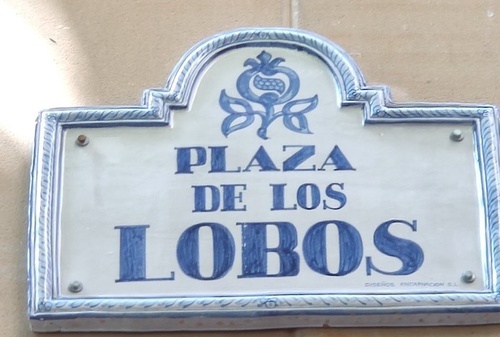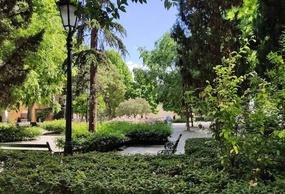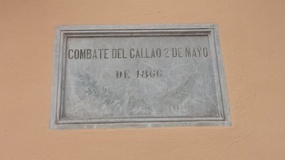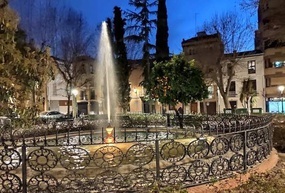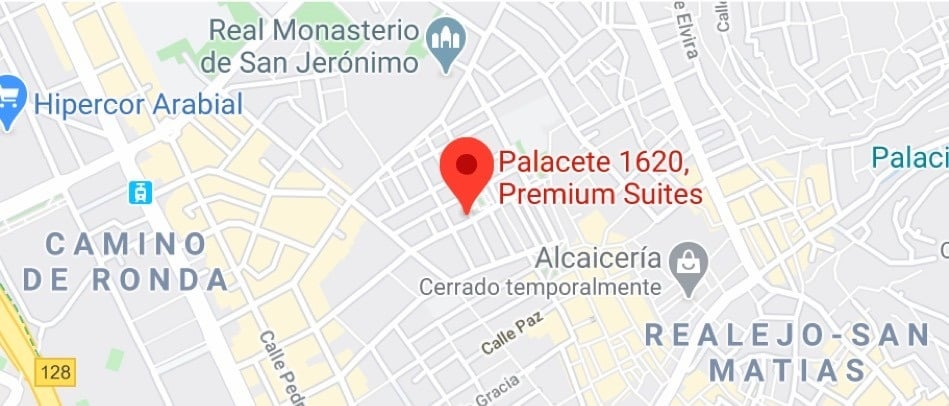History
Extract from a directory of palaces and noble houses of Granada:
Plaza de los Lobos 6, Granada,
Corner building with three floors. The main façade, remodeled in the 19th century over the original, has an even distribution of openings, with two closures at the ends of the main floor, large balconies on the second floor and smaller balconies on the upper floor and is covered with shaped and carved stone. The side facade has two large wrought iron grills and other elements from the 17th century. The main door is made of wood, on pivots, with inset side door, and iron nails, hinges and doorknobs.
The wide entryway leads to a second doorway. This doorway opens into the courtyard, surrounded by columns on all four sides, with eight Tuscan columns on prismatic plinths of Sierra Elvira stone and carved bases. The patio floor is paved with stone and has a central fountain and a water basin attached to the back wall (both made of stone). The water basin has a magnificent heraldic shield that dates from 1620. The side passageways of the patio have beautiful wood ceilings with paintings. The staircase has iron railing and steps with stone from Sierra Elvira.
Originally, the building grounds extended back to the street Lavadero de las Tablas, with service buildings that surrounded a patio garden, as noted in the floor plan of Fernando Wilhelmi from 1928.
Picture: The front of the hotel, located in the Plaza de los Lobos (Plaza of the Wolves)
The Plaza de los Lobos, one of the most characteristic plazas of Granada, retains much of its old charm. This may be due to the absence of cars and because there are no outdoor tables with gaudy umbrellas and advertisements from nearby bars. The truth is that it remains a square with a traditional atmosphere, of which few remain. The plaza of a neighborhood with a rich history and in which, until recently, boys played games and girls sang children's songs, in circles, holding hands.
In this plaza, on the corner of the street Horno de Abad, the hotel is located in a renovated residence - the building pictured above one - very much in line with the traditional Granada houses from the past. The writer and diplomat Melchor de Almagro San Martín, tireless traveler and distinguished observer of the Europe of his time - early in the last century - wrote beautifully about the typology of the noble mansions of our city, which he considered direct descendants of ancient Roman dwellings.
"Visiting the ruins of Pompeii, I thought I discovered the traces of buildings familiar for me." In the opinion of that cultured observer of life and society, the climate and character of the people of Granada had created a similar type of construction, although smaller in size and more comfortable. Elegant, welcoming houses, open to the air with cheerful courtyards and flowery gardens, which were a true pleasure for their owners.
This beautiful palace on the Plaza de los Lobos (now a beautifully restored hotel) belongs to this style of mansion. Built in the early seventeenth century, with a façade that was restored in the nineteenth century. It has two magnificent enclosed balconies at both ends of the second floor, with two smaller balconies in between, and has an additional four balconies on the third floor. On the side façade, on the street Horno de Abad, it still has the elegant wrought iron grills covering the openings and windows, very likely from the XVII century.
It is unfortunate that the interior door at the end of the entryway shields the view of the beautiful courtyard, with magnificent Tuscan columns, beautifully carved bases “and a pillar attached to the lower wall, made of stone from Sierra Elvira – as noted by Carlos Jerez Mir in his Architectural Guide of Granada - with a magnificent heraldic shield with the date of 1620 ”. The name of the noble lineage represented by this emblem has not been identified, although this house was perhaps owned at one time by a wealthy Grenadian gentleman, Manuel de la Sota, treasurer of various factories and mills in the nearby Alpujarra and the Valley of Lecrin.
Battle of Callao
On the facade of the building, there is a stone commemorative plaque with the following inscription "Combat of Callao, May 2, 1866". It is in memory of a naval action that the Spanish Navy, led by the Galician sailor and admiral of the fleet Casto Méndez Núñez, undertook against the port of Callao in Peru. In that battle, two Granada-born midshipmen named Rull and Godinez lost their lives. In homage to them, the City Council changed the name of the plaza to Rull and Godinez Plaza, placing the new name on this house along with the commemorative plaque.
When the city found that people kept calling the square by its old name the Plaza de los Lobos (Plaza of the Wolves), the city government returned its old name to the plaza. Only the commemorative plaque remains, whose text, despite its brevity, is difficult to read because - like all of its kind in the city – it is in need of cleaning.
The Wolves
In the seventeenth century this plaza was very lively in winter, due to the comings and goings of the hunters that hunted wolves with snares and traps on the slopes of the Sierra Nevada. The hunting was not merely for sport, but also economically profitable. This is well documented in ordinances issued by the Municipal Council, according to which "for each litter of wolves that are killed the reward will a hundred maravedis." Of course, this had to be demonstrated, with each animal marked with cuts in the ears to prevent the more "clever" trying to earn the bounty more than once for the same animal. To collect for the animals, they had to be brought to the house called Casa de los Lobos (house of the wolves), dedicated to this purpose, which is how the plaza came to have its name.
The wolves, like other dangerous predators, roamed very close to the city at that time. Especially in years of extremely hard winters, with abundant and long lasting snowfalls, they wreaked havoc on the livestock in the fields, and even went so far as to attack horses in the stables and the shepherds and other daring individuals who risked going out alone on the roads. When fear spread among the population, because of reports of wolves at the gates of Granada, the City Council was obliged to increase the bounty for hunting them.


